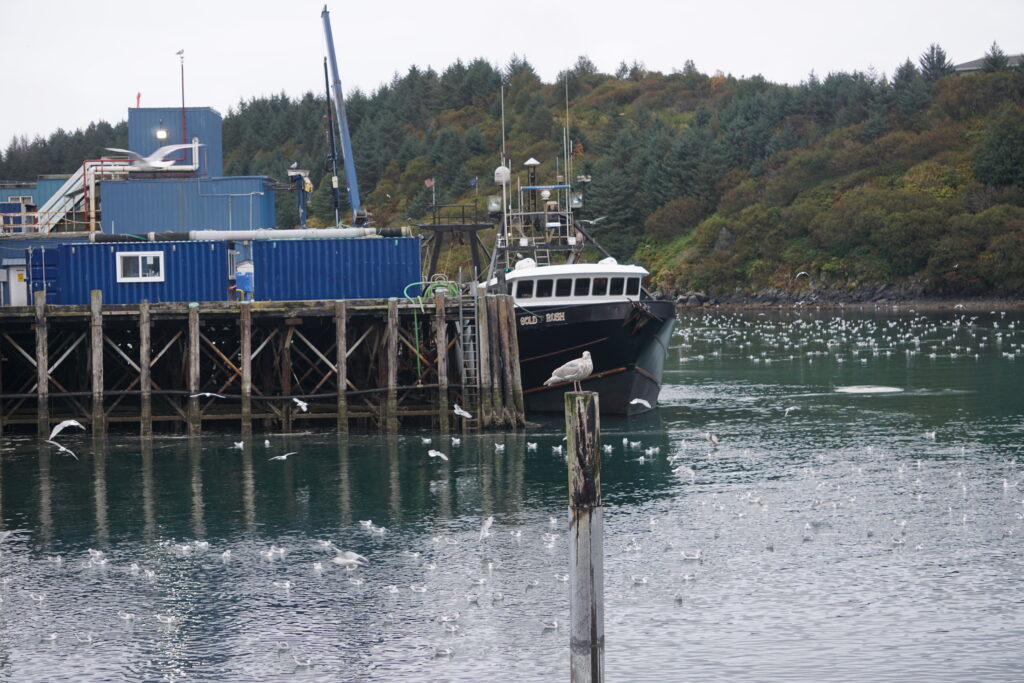The fishing vessel Gold Rush, which harvests pollock and other groundfish, is docked on Oct. 3, 2022, at Trident Seafood’s Kodiak plant. (Photo by Yereth Rosen/Alaska Beacon)
Alaskans are all too familiar with radical groups funded by out-of-state interests seeking to shut down sustainable resource development. A predictable cast of characters – including billionaire activists and extreme environmental groups – are now working to destroy a large segment of the Alaska seafood industry. This campaign to ban trawling – a sustainable fishing method responsible for a substantial majority of fishery landings in the Alaska Region and nationally – poses a direct threat to Alaska’s coastal economy, seafood sector and way of life.
If you enjoy wild seafood – fish sandwiches or shrimp; fish sticks or scallops; fish tacos or rockfish – you are enjoying seafood caught by “trawl” or “dredge” fishing gears that touch the seafloor. It’s true that these fishing methods, like every farm, aquaculture facility and fishing operation on the planet, impact the environment. But, what’s also true is that the impacts of trawl fishing in Alaska are continually monitored to ensure long-term ecosystem health.
Few food production methods anywhere in the world are more sustainable and well-regulated than fisheries in the Alaska region, a fact we should all be proud of. Fishery scientists and managers use a clear, science-based process to decide where and when fishing can happen and how many fish can be caught. This results in sustainable Alaska fisheries – fisheries that support tens of thousands of jobs and many coastal communities – producing billions of seafood meals every year to feed people in America and around the world.
The recent commentary authored for the Alaska Beacon by Heather Sauyaq Jean Gordon and David Bayes is the latest effort to demonize sustainable trawl fisheries. Like other attacks on our sector, the commentary comes from a vocal few that play fast and loose with the facts.
First, let’s talk about bycatch. The authors’ claim that trawl fisheries have “high bycatch rates” is flat out wrong. The Alaska pollock fishery, for example, is recognized by the National Marine Fisheries Service as “one of the cleanest in terms of incidental catch of other species (less than 1 percent).” By way of contrast, the fixed-gear halibut and sablefish fisheries championed by Linda Behnken—one of the commentary’s co-signatories—have bycatch rates at least 28 times higher than the Alaska pollock fishery, with discard rates ranging from 28.5% to 48%.
We weren’t surprised to see the inaccuracies in Thursday’s piece. Trawl critics constantly misrepresent bycatch data. For example, jellyfish—nearly 40% of the 1% bycatch in the pollock fishery—are deliberately grouped with other species in reported bycatch totals. In reality, less than 10% of trawl bycatch is made up of halibut, salmon and crab species, with pollock representing the largest component of total trawl bycatch.The dead halibut thrown overboard by the Gulf of Alaska IFQ halibut fishery exceeds the total halibut bycatch mortality from the entire Gulf of Alaska trawl fleet.
Let’s talk about monitoring. Alaska trawl fisheries lead the world in using independent observers and electronic monitoring to ensure full transparency. Across all Alaska Region trawl fisheries, 94% of the total catch was independently observed in 2023. Furthermore, Alaska’s pollock catcher vessels are implementing the largest Electronic Monitoring program in the United States, which will push North Pacific trawl vessel monitoring even higher, to almost 100%. Among the fleet that Linda Behnken represents, by contrast, just 23% of total 2023 harvests were observed by either electronic or human monitoring and there has been resistance to monitoring expansion.
Let’s talk about habitat. The emotive claim that trawl gear “scrapes the ocean’s bottom” implies permanent ecosystem harm. In reality, the Bering Sea floor is constantly subject to tidal and storm disturbance, and any additional impacts of trawling have consistently been found by experts to be “temporary and minimal”. Areas that have been regularly fished with trawl gear for decades remain some of the most diverse and productive fishing grounds on Earth.
David Bayes, a charter fisherman and a co-author of the recent commentary, has regularly attacked our region’s sustainable trawl fisheries. The Facebook page he founded often features posts that wish death or harm toward our fellow captains and crew, our boats and our processing plants. Other posts spew hateful, personal and vengeful attacks against anyone who dares to speak up and correct misinformation about trawling or Alaska pollock. Alaskans deserve better than this.
In October, Mr. Bayes attended a meeting of billionaire environmental funders that showcased a clear anti-fishing agenda. Panels like “Bycatch: Building Power Around Alaska’s Newest Four-Letter Word” revealed a roadmap for shutting down Alaskan fisheries. Oceans 5, a key sponsor of the meeting, pools money from billionaire activists to fund campaigns displacing harvesters from their traditional fishing grounds. Their main goal? Establishing Marine Protected Areas that ban all fishing activity. If Bayes’s activist allies succeed in shutting down Alaska’s trawl fisheries, don’t think they’ll stop there. Other fisheries—and even sport fishing—could be next in their crosshairs.
We take pride in harvesting Alaska pollock and other groundfish, contributing to Alaska’s rich fishing heritage, coastal communities, and economy. Alaskans deserve honest discussions about fisheries, which often require complex trade-offs. As warming oceans—not trawl fleets—affect certain salmon and crab stocks, making informed decisions is extremely challenging. We welcome fair debates grounded in truth, transparency, and facts that can help sustain all Alaskan fisheries.
SUBSCRIBE: GET THE MORNING HEADLINES DELIVERED TO YOUR INBOX
Source link : http://www.bing.com/news/apiclick.aspx?ref=FexRss&aid=&tid=675ad5837d1644dc9f03dfd02cb64fc0&url=https%3A%2F%2Fwww.yahoo.com%2Fnews%2Falaska-trawl-fisheries-vital-under-184217514.html&c=14395622403683005562&mkt=en-us
Author :
Publish date : 2024-12-11 05:42:00
Copyright for syndicated content belongs to the linked Source.
